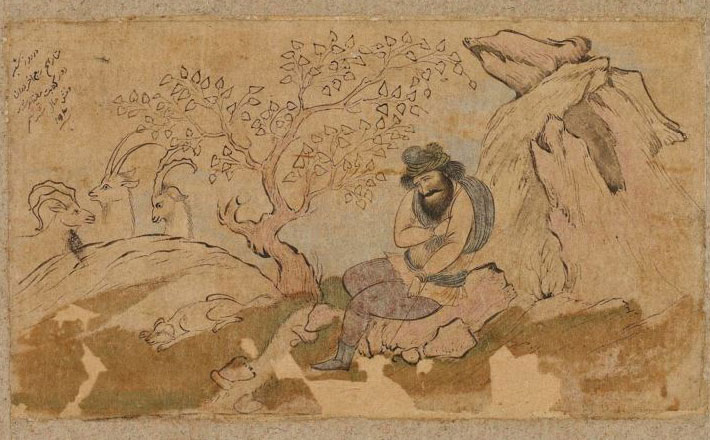Commentary on Psalm 23
Even audiences largely unfamiliar with the Bible’s contents are likely to know phrases from Psalm 23 (though whether or not they know what they are hearing is biblical is another question!).
Used in countless television scenes and movie shoots, often as protagonists stumble toward their inevitable death or as mourners huddle around a graveside, the invocation of 23:4 in popular culture has lead many to associate this psalm of trust with death and mourning.
From the perspective of form criticism, Psalm 23 is a “song of trust,” as are Psalms 4, 11, 27, 16, 62, and 131. Songs of trust have two things in common: a perceived calamity of some kind and trust that the calamity or disaster shall pass and all will be well. In fact, as scholars often note, in these songs of trust it is the very crisis that instigates the psalmist to cry out in trust — and not, as one might expect, in despondency or dejection. For example, in Psalm 27, trust comes even when standing in the midst of flesh-devouring evildoers and with armies encamped all around (27:1-3).
Yet what crisis was Psalm 23 addressing? And was that crisis one that centered on death, as is so often the case when the psalm is invoked today? Psalm 23 is quiet on the crisis that led to its composition. Rather it functions to remind its audience of the relationship between God and God’s people — and, perhaps most importantly, the psalm reminds readers about the beauties of living life in the here and now even amid the usual darkness that accompanies day-to-day life. The psalm begins with a faithful and hopeful claim, “The Lord is my shepherd, I shall not want.” As scholars often note, the Hebrew verb haser, translated in the NRSV as “want,” is same verb found in Deuteronomy 2:7, “Surely the Lord your God has blessed you in all your undertakings; he knows your going through this great wilderness. These forty years the Lord your God has been with you; you have lacked nothing” (compare Nehemiah 9:21, “Forty years you sustained them in the wildness so that they lacked nothing”). The invocation of two passages related to the forty years of wandering following the Exodus is noteworthy: God took care of the people then as they wandered through the desert. To be sure, life wasn’t always easy — but it was life. Those forty years might have seen a lot of grumbling and complaining, but they also saw manna free from heaven, the birth of a new generation, and eventual progress to the Promised Land. God cared for the wandering people — and they lacked nothing. The benefits of the relationship are clear: have faith in the God who shepherds you through the wilderness, for history tells you that this God will not let you lack what you need. This God will lead you to the Promised Land, providing you green pastures (food), still waters (drink), and a straight path (protection).
The shepherd metaphor continues, “Even though I walk through the darkest valley, I fear no evil; for you are with me; your rod and your staff — they comfort me” (Psalm 23:4). Though the King James translation — the “valley of the shadow of death” — is most famous, the more appropriate translation from the original Hebrew is likely something more akin to “darkest valley” (NRSV) or “deepest darkness” (New Jewish Publication Society). In fact, a number of interpreters over the years have understood the passage more in line with these recent translations, which shift the focus away from the only possible mention of death in a psalm that otherwise focuses on a shepherd sustaining the life of the flock. For example, Martin Luther noted how odd it was that the beginning of the psalm — which claims that God provides and the psalmist does not want — is followed by the well-known passage in v. 4. Nevertheless, those in the know recognize that God is nevertheless shepherding them through these dark experiences, keeping them safe and guiding them (even if, per Luther, “the world cannot see this rich, splendid comfort of the Christians, that they want nothing” [Luther, Psalm 23:4]). Despite how perplexing it might be while we stumble our way through the darkness, hope and trust are appropriate responses; they keep us moving toward life.
The final two verses of the psalm move to the second metaphor: God is a gracious host who prepares a banquet table for the psalmist (see Psalm 92:11). This table is spread “in the presence of my enemies,” who seem to watch from the sidelines as God anoints the head of the psalmist and fills the psalmist’s cup to overflowing (23:5). The psalm continues, “Surely goodness and mercy shall follow (radap) me all the days of my life.” The Hebrew word translated in the NRSV as “follow” is also found in a number of verses scattered throughout the larger biblical text that deal with enemies, but always as “pursue.” A few examples: “The enemy said, ‘I will pursue (radap), I will overtake, I will divide the spoil, my desire shall have its fill of them. I will draw my sword, my hand shall destroy them’” (Exodus 15:9); “then let the enemy pursue (radap) and overtake me, trample my life to the ground” (Psalm 7:5); “For the enemy has pursued (radap) me, crushing my life to the ground, making me sit in darkness like those long dead” (Psalm 143:3); “Israel has spurned the good; the enemy shall pursue (radap) him” (Hosea 8:3). Playfully, Psalm 23:6 turns the image of an enemy who pursues — a frightening image to be sure — into something wonderful, good, and life-affirming. Accordingly, a more accurate reading might be, “Surely goodness and mercy shall pursue me all the days of my life.” The psalm ends with yet another nod toward life and living: “I shall dwell in the house of the Lord my whole life long”; here the “house of the Lord” refers to the Temple (see Psalm 27:4). Again, the psalm emphasizes life in there here-and-now, and the ways in which life in the here-and-now can be joyous and banquet-filled, especially if one trusts in guidance and protection of the shepherd and the benevolent provider of the banquet.
Psalm 23 reminds readers that God sustains, provides, and cares for his flock not once but time and time again — fleeing from Egypt, returning from Exile, and as we walk through darkness. Psalm 23 reminds readers that goodness can pursue them as well as travails. Moreover, in this Easter season, Psalm 23 serves a reminder to live — in the face of danger and misfortune, even in the shadows of darkness that might surround us, and to know that in living we will be sustained.


April 17, 2016